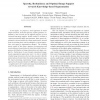Free Online Productivity Tools
i2Speak
i2Symbol
i2OCR
iTex2Img
iWeb2Print
iWeb2Shot
i2Type
iPdf2Split
iPdf2Merge
i2Bopomofo
i2Arabic
i2Style
i2Image
i2PDF
iLatex2Rtf
Sci2ools
111
Voted
CVPR
2008
IEEE
2008
IEEE
Sparsity, redundancy and optimal image support towards knowledge-based segmentation
In this paper, we propose a novel approach to model shape variations. It encodes sparsity, exploits geometric redundancy, and accounts for the different degrees of local variation and image support. In this context we consider a control-point based shape representation. Their sparse distribution is derived based on a shape model metric learned from the training data, and the ambiguity of local appearance with regard to segmentation changes. The resulting sparse model of the object improves reconstruction and search behavior, in particular for data that exhibit a heterogeneous distribution of image information and shape complexity. Furthermore, it goes beyond conventional imagebased segmentation approaches since it is able to identify reliable image structures which are then encoded within the model and used to determine the optimal segmentation map. We report promising experimental results comparing our approach with standard models on MRI data of calf muscles - an application where t...
Computer Vision | Control-point Based Shape | Conventional Imagebased Segmentation | CVPR 2008 | Optimal Segmentation Map | Shape Complexity | Shape Model |
| Added | 12 Oct 2009 |
| Updated | 12 Oct 2009 |
| Type | Conference |
| Year | 2008 |
| Where | CVPR |
| Authors | Salma Essafi, Georg Langs, Nikos Paragios |
Comments (0)

